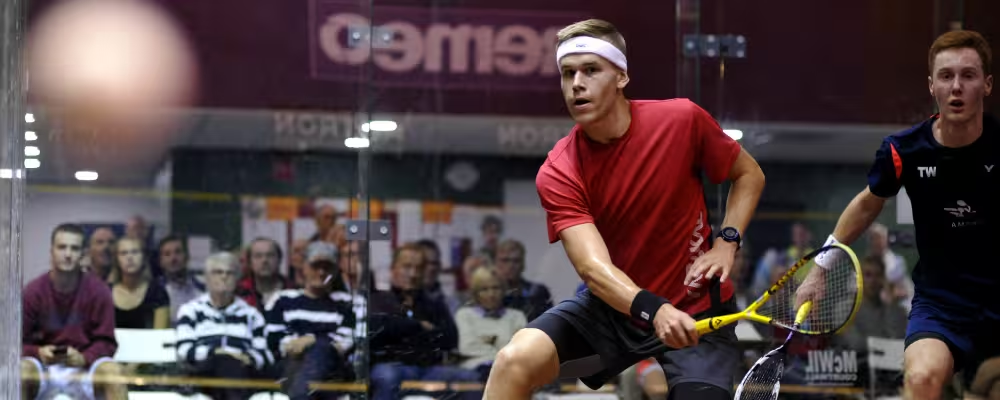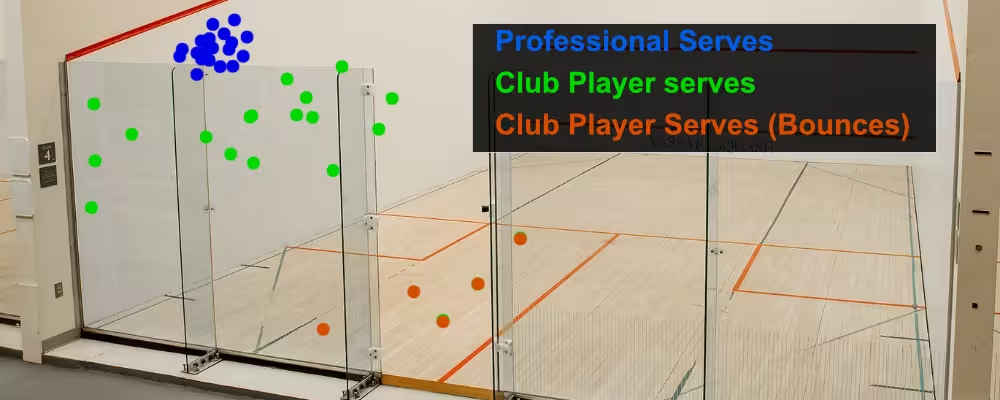22 January 2024 / 5-Min Read / Translate
In the last few years, I have performed quite a few Video Analysis for club players and one aspect that appears over and over, and can be challenging to communicate, is suggesting a player change something that is seemingly successful or proposing an alternative shot-selection from a shot that was a winner.
A good example, and quite common, is the reverse angle, often called the “Leisure Centre Boast”. To an experienced eye, the shot is obvious to see before the player hits it, is in play for longer than a straight push into the same front corner and generally leaves the striker badly positioned. “But Phillip, it was a winner!” is often a response I hear. “But the pros play them!” is another one.
What works well against opponents of certain standards doesn’t always work well against better opponents. And this brings us to the heart of the problem: Do you think short-term or long-term? Want to win a particular match? Think short-term. Want to consistently improve? Think long-term.

The moment you move up a level, grade, box or any other form of “standard”, the shots that won you points often become liabilities. That reverse angle that you loved so much, is now destroyed by your better opponents. What do you replace it with? It’s become such an ingrained shot, you can be left with no other options.
If we were to invent some sort of squash notation that would allow people to “follow” the pattern of shots played in a match, I am convinced that simply by looking at the notation you could judge the standard of players.
Shot selection is a complex subject and many factors influence it. As a thought experiment, if we put an average club player in the body of a professional, do you think they would play pro-level squash? Certainly not at the beginning, and maybe not even after a month in the pro body. We have habits when it comes to the choices we make, irrespective of the body we are in.
Now let’s take a professional squash player and put them in the body of an average club player. What do you think would happen? I have no doubt that they would play great squash, even with the limits of the physicality of the average player. No, they wouldn’t play pro-level squash, but they would play better squash than the average club player in the average club layer body.
The key point here is that while the body is definitely a limiting factor, the mindset can override certain limitations.
I’ve said this many times before; the better you get at squash, the less aggressive your serves become. Better squash players often attack serves from weaker players. Club players often hit hard serves, serves at the opponent, serves down the middle and serves that hit the side wall near the short line. This variation causes players of similar standard lots of problems. The receiver struggles to adapt to the variation and often hits weak returns.
Play those same serves against better players and suddenly those serves become easy pickings for the receiver. It can be such a shift in perspective that the weaker player has no answer. They haven’t developed a simple high, deep serve that limits their opponent. I would love to see a heat map of pro serves versus club players. Changes are that the pro serves would be on average slower and much more grouped.
In fact, I cheated and created my own. I took no real data and instead invented what I thought it would look like. Here is the image.

I've also seen some pretty strange technical adaptations. If players don't have coaching from an early age, they they often (maybe even always!) develop some pretty strange swing techniques. Unfortunately, they can sometimes be consistently effective. I say unfortunately because as a coach I now have to decide how forceful I should be in encouraging a pupil to change something.
Other coaches will recognise that thought process. If a pupil doesn't stay long enough to develop the swing properly, they can be left in a worse situation than when they come to you. Coupled with the fact that some pupils just never break those bad habits. It reminds me of what David Grohl (Foo Fighters) said about learning to play the drums. The problem is that for one Dave Grohl, there might be 100,000 people who aren't successful using the wrong technique to hold drum sticks.
As a player, you have to base your decision on your circumstances and your character. If a 45-Year old player said to me that they just couldn't dedicate the time and energy to change their grip, I would completely understand that. Other players in the same circumstances might choose to change it. There is no objectively correct decision.
Learning new swings and grips often cause a player to experience a deterioration in their squash, at least in the short-term. Some players accept this, other players don't.
It is possible to do something badly and still be successful - but only up to a certain level. At some point in your squash journey, you will face a decision: keep doing what I am doing and get the same results or change what I am doing in the hope of a better squash future.
When I was working as a fulltime, professional coach, I was inspired by the older players who came to me looking to improve. Personally, I agree that age should not be a barrier to improve. Sure, a 70-year old player is not going to get any fitter, but they can learn to more better or strike the ball more cleanly, as well as ways to cause as much difficulty to their younger opponents as possible!
Please don't use Dave Grohl as your excuse for not thinking long-term. Remember, my articles are generally aimed at ambitious players, but if you play recreationally, not competitively and are happy with your game, then that's great. Don't change for the sake of change. Change because you want to get better.